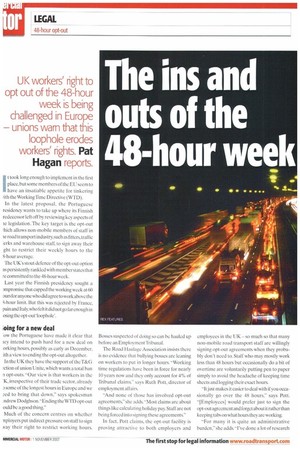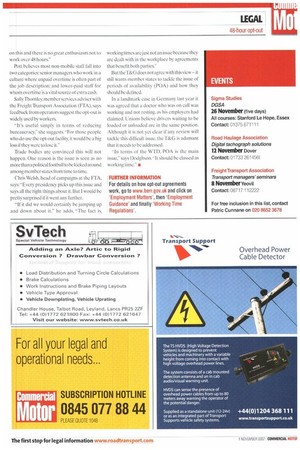The ins and outs of the 48-hour week
Page 42

Page 43

If you've noticed an error in this article please click here to report it so we can fix it.
UK workers' right to opt out of the 48-hour week is being challenged in Europe
— unions warn that this
loophole erodes workers' rights. Pat
Hagan reports.
It took long enough to implement in the first place,but some members of the EU seem to have an insatiable appetite for tinkering 4th the Workinglime Directive (WTD).
In the latest proposal, the Portuguese residency wants to take up where its Finnish redecessor left off by reviewing key aspects of re legislation. The key target is the opt-out rhich allows non-mobile members of staff in le road transport industry,such as fitters,traffic lerks and warehouse staff. to sign away their ght to restrict their weekly hours to the s-hour average.
The UK's stout defence of the opt-out option as persistently rankled with member states that re committed to the 48-hour week.
Last year the Finnish presidency sought a 3rnpromise that capped the working week at 60 ours for anyone who did agree to work above the s-hour limit. But this was rejected by France, pain and Italy, who felt it did not go far enough in osing the opt-out 'loophole'.
oing for a new deal
ow the Portuguese have made it clear that ley intend to push hard for a new deal on orking hours, possibly as early as December, ith a view to ending the opt-out altogether. In the UK they have the support of the T&G tction of union Unite, which wants a total ban a opt-outs. "Our view is that workers in the IC, irrespective of their trade sector, already 3 some of the longest hours in Europe and we :.ed to bring that down," says spokesman .n drew Dodghson.-Ending the WTD opt-out ould be a good thing."
Much of the concern centres on whether ployers put indirect pressure on staff to sign .vay their right to restrict working hours. Bosses suspected of doing so can be hauled up before an Employment Tribunal.
The Road Haulage Association insists there is no evidence that bullying bosses are leaning on workers to put in longer hours. "Working time regulations have been in force for nearly 10 years now and they only account for 4% of Tribunal claims." says Ruth Putt, director of employment affairs "And none of those has involved opt-out agreements," she adds. "Most claims are about things like calculating holiday pay. Staff are not being forced into signing these agreements."
In fact, Pott claims, the opt-out facility is proving attractive to both employers and employees in the UK — so much so that many non-mobile road transport staff are willingly signing opt-out agreements when they probably don't need to. Staff who may mostly work less than 48 hours but occasionally do a bit of overtime are voluntarily putting pen to paper simply to avoid the headache of keeping time sheets and logging their exact hours.
"It just makes it easier to deal with if you occasionally go over the 48 hours," says Pott. "[Employeesj would prefer just to sign the opt-out agreement and forget about it rather than keeping tabs on what hours they are working.
"For many it is quite an administrative burden," she adds. "I've done a lot of research on this and there is no great enthusiasm not to work over 48 hours."
Putt believes most non-mobile staff fall into two categories: senior managers who work in a culture where unpaid overtime is often part of the job description: and lower-paid staff for whom overtime is a vital source of extra cash.
Sally Thorriley,memher services adviser with the Freight Transport Association (FTA), says feedback from operators suggest the opt-out is widely used by workers.
"It's useful simply in terms of reducing bureaucracy," she suggests, "For those people who do use the opt-out facility it would be a big loss if they were to lose it."
Trade bodies are convinced this will not happen. One reason is the issue is seen as no more than a political football to be kicked around among member states from time to time.
Chris Welsh, head of campaigns at the VIA, says: "Every presidency picks up this issue and says all the right things about it, But I would be pretty surprised if it went any further.
"If it did we would certainly be jumping up and down about it," he adds, "The fact is, working times are just not an issue because they are dealt with in the workplace by agreements that benefit both parties."
But the T&G does not agree with this view — it still wants member states to tackle the issue of periods of availability (POA) and how they should be defined.
In a landmark case in Germany last year it was agreed that a doctor who was on call was working and not resting, as his employers had claimed. Unions believe drivers waiting to be loaded or unloaded are in the same position. Although it is not yet clear if any review will tackle this difficult issue, the T&G is adamant that it needs to be addressed.
In terms of the WTD, POA is the main issue," says Dodghson. "It should be classed as working time." •






















































































































































































